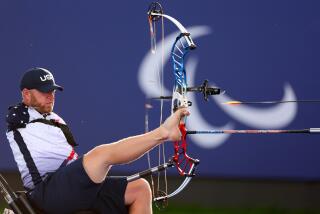Manifesto for Marxes Covers Both Sides of Fence
- Share via
ATLANTA — Leslie Marx could not stand up, would not stand up.
That was her husband on the canvas, bobbing underneath a mask, swinging a sword against a grunting Hungarian named Kovacs.
That was her man Michael, fencing so passionately in a second-round Olympic match that his free hand trembled, and a small crowd howled.
That was a made-for-Hallmark moment.
But Leslie Marx wasn’t buying.
Or, standing.
“I need to be careful,” Leslie said. “I don’t want to use too much energy. I have to think about my own match.”
Michael lost badly, and alone. He walked to the dressing room with Leslie several paces behind.
He entered, she followed, and you like to think that soon afterward, they hugged.
But you do not know.
This being the story of the imperfect union of two picture-perfect Olympians, there are things you do not want to know.
Michael and Leslie Marx are the first married couple in the history of U.S. fencing to qualify for the Olympics, both in epee.
He is her veteran coach, she is his rookie pupil.
He takes care of the house, she takes care of most of the bills as Dr. Leslie Marx, economics teacher at the University of Rochester in New York.
They have practiced together in their basement.
They have playfully fenced with everything from toothbrushes to straws.
They are the poster couple for a sport desperate to emerge from beneath its mask and knickers.
But they can’t wait for today, when medal-favorite Leslie will compete in her event.
When seven months of blade-bending stress will be over.
“Everyone says, ‘Yeah, well, it will all be worth it,’ ” said Leslie, 29. “Well, right now, it is not clear that it will be worth it.”
She paused and brushed a strand of dark blond hair from a figurine face.
“I mean, it has been one hell of a year.”
In a separate interview, Michael, 38, took that thought one superlative farther.
“It’s been the longest year of my life,” he said. “I can’t wait for the Olympics to be over with.”
While watching the fanfare of the next two weeks, think of the Marxes and understand that even Kodak moments can be marred.
Like this:
While traveling to separate parts of the world in pre-Games events, the couple admitted that sometimes more than a week passed without their speaking to each other.
“We would be off in different corners of the world, doing our own thing,” Leslie said.
And like this:
While working together on things at home, their patience would sometimes disappear.
“I work with computers, and Michael is trying to learn computers, and so he would try to figure out how to get his E-mail . . . and I would say, ‘I don’t know what to do, just try something else!’ ” Leslie said. “He has to know exactly how to do everything.”
“Of course I do,” Michael said. “I’m 38. I’m too old to learn anything new.”
And like this:
When they actually fence each other, it is more competitive than fun.
“Put it this way, it’s much better for me if she wins,” Michael said.
Once, Leslie became so angry that fencing became boxing. She actually punched him on the helmet in hopes of convincing him to try harder.
Michael admitted that there were times this year when bad feelings even seeped onto the mat.
While counseling her in the corner between rounds, he would substitute sarcasm for strategy.
“If I tell her to stop doing something that doesn’t work, and she doesn’t listen, I might say something like, ‘Well, why don’t you try that again?’ ” he said. “From a coaching standpoint, that’s OK. But from a husband standpoint, maybe not.”
There is little time for children--”We may never have any children,” Leslie said.
There is even less time for the little rituals that bond couples in times of hardship. No good-luck hugs or kisses, no superstitious chants here.
“I can’t start doing something with Michael before each match, because he can’t be at all of my matches,” Leslie said. “He has his own career.”
Leslie was not even a nationally ranked fencer when she and Michael married in 1989. He persuaded her to try epee. But she thrived in his world.
This is his fifth Olympic team, her first.
“I would not be where I am today without him,” she said.
“She could win a medal,” he said. “It is hard to beat her straight up.”
She will try to win that medal today, in competition with 44 other fencers.
After Michael’s loss Saturday, Leslie gathered some friends for one final lunch.
“You want to join us?” she asked him.
“I’ve got a lot of people who came to see me today, I can’t just walk out of here,” he said.
“OK, then, I’ll see you later,” she said.
“OK,” he said.
They briefly touched hands, their eyes locking, and for a moment there were smiles. Hopeful smiles that spoke of a future, away from this quadrennial athletic exercise, a future when a couple could once again be a couple.
More to Read
Go beyond the scoreboard
Get the latest on L.A.'s teams in the daily Sports Report newsletter.
You may occasionally receive promotional content from the Los Angeles Times.







